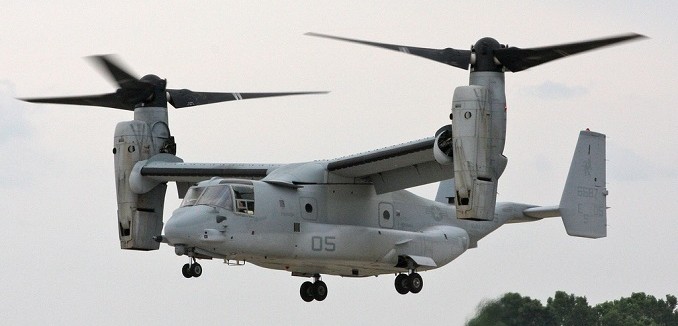A few weeks ago, in a meeting with Israeli Defense Minister Moshe Ya’alon, Secretary of Defense Chuck Hagel announced that the U.S. would be providing its Israeli allies with an “unprecedented” military package to cope with instability in the region and with the deepening threat posed by Iranian conventional and unconventional weapons.
More details are now emerging about what that package will include. Critically, the U.S. will facilitate the transfer of Osprey tiltrotor aircraft to Israel. The assets are by design versatile, but it’s one particular scenario in particular that analysts are pointing to:
The Osprey “is the ideal platform for sending Israeli special forces into Iran,” says Kenneth Pollack, a former CIA analyst now at the Brookings Institution’s Saban Center for Middle East Policy. The aircraft could help solve Israel’s inability to breach Iran’s uranium enrichment facility buried under a granite mountain at Fordow. It might be impregnable to even the heaviest conventional bunker-busting munitions in the U.S. arsenal, Pollack said. Israeli military planners have been brainstorming how to conduct an effective operation, Pollack said, citing conversations with senior Israeli military officers.
“One of the possibilities is (Israel) would use special forces to assault the Fordow facility and blow it up,” Pollack said.
American defense manufacturers have also started delivering previously purchased Super Hercules C-130J transport aircraft, which are viewed as enhancing the Jewish state’s strategic capabilities.
Bilateral U.S.-Israeli military ties have long been cited as critical to the defense capabilities of the U.S. and its allies. The Iron Dome missile defense platform, developed in Israel with American assistance, is being considered for deployment by South Korea, above and beyond the success it has shown in preventing the escalation of regional wars. Analysts describe the U.S.-Israel relationship as a “two-way street”:
The U.S.-Israel relationship isn’t symmetrical, as the U.S. provides Israel with indispensable economic and military support — to the tune of more than $115 billion since 1949. But it is a two-way street.
Israel has contributed to American “hard security” through counterterrorism cooperation, intelligence sharing and the development of such innovations as unmanned aerial vehicles and missile defense. And Israel also has contributed to America’s “soft security”: Advances in the high-tech, medical and sustainability sectors have helped maintain American economic competitiveness and promoted sustainable development… By helping to ensure the United States maintains its global edge, Israel will continue to contribute to Americans’ lives and livelihoods, and to restoring the global economic competitiveness of the United States.
[Photo: Armchair Aviator / Flickr]




